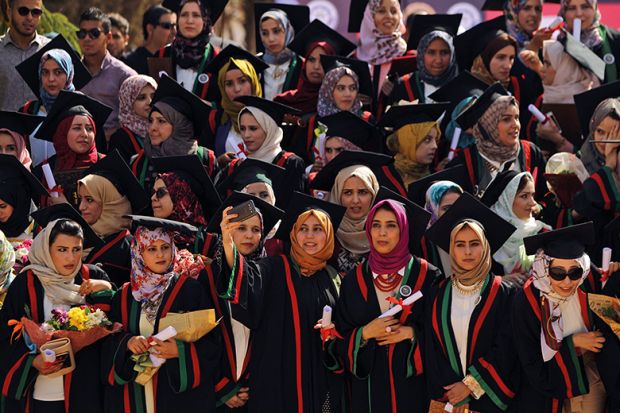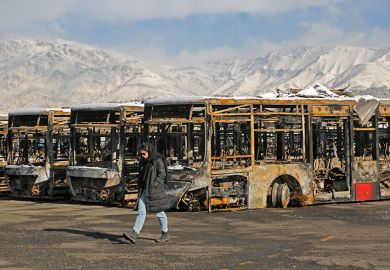Students in the Middle East and North Africa are too often more interested in “acquiring” a degree than developing the understanding that should come with it, a leading scholar has warned.
Safwan Masri, Columbia University’s executive vice-president for global centres and global development, said too many young people were steered into courses focused on science and engineering when critical thinking and intercultural understanding were desperately needed across the region.
Speaking at Times Higher Education’s MENA Universities Summit, Professor Masri said future leaders being trained in institutions across the region were “not fully prepared to lead”, the product of “technocratic societies led by a global technocratic class”.
“Students – and the parents who bankroll them – are often more interested in acquiring professional certification than truly understanding the world and the role of an educated citizen within it,” said Professor Masri.
“Here in MENA, young people fortunate enough to attend university are almost unilaterally steered into STEM training.
“But STEM competency is only half of the equation. We need people who also know how to organise societies, articulate and secure alignment on political ideals, and build robust civil societies that expand rights and freedoms to historically marginalised groups.”
Professor Masri, an expert on the contemporary Arab world and the head of Columbia’s study centre in Amman, Jordan, said the solution had to be a greater embrace of liberal arts education across the region.
He acknowledged that this “won’t be easy” because generations of Arabs “have been indoctrinated with hyper-nationalist propaganda, exclusionary rhetoric and dogmatic religious discourse at the expense of critical thinking and questioning skills”.
“Progress cannot be achieved without deprogramming and reprogramming this mindset, to learn to coexist with different points of view and ways of life,” Professor Masri said.
“Unless liberal arts training is more highly valued in this region, the region’s ambitions will be thwarted. We must achieve balance. We must help students – and the parents who fund many of them – understand the crucial interplay between content [of academic training] and context [understanding of society].”
At the summit, held online in partnership with NYU Abu Dhabi, Professor Masri also argued that at a time of geopolitical turmoil and “historic levels of misunderstanding” between countries and the people within them, knowledge diplomacy led by universities “may be our last and best tool if we are to rebuild a broken world”. He highlighted Columbia’s decision to maintain its global centre in Istanbul even in the face of Turkey’s increasing persecution of academics.
“The solution wasn’t to give in, we contended, but to dig in – to support academics and students, to continue to share knowledge,” Professor Masri said.
But Professor Masri expressed concern about the “weaponisation” of knowledge, highlighting that while Gulf states’ attempts to exercise soft power by funding Middle East studies centres in Western universities ostensibly had “no strings attached”, there were “uncomfortable stories” of researchers at these centres coming under pressure after writing about issues such as human rights and democracy.
A better model of knowledge diplomacy, he argued, was that of the Covid vaccines, which were the result of thousands of researchers crossing the globe over decades, generating the knowledge that informed the vaccines’ designs.
“The Covid vaccine represents decades’ worth, perhaps even centuries’ worth, of university-generated knowledge – distilled down to little more than an ounce of liquid, all concentrated in a single shot,” Professor Masri said.
“This medical and scientific breakthrough will reconnect the people of the world.”
Register to continue
Why register?
- Registration is free and only takes a moment
- Once registered, you can read 3 articles a month
- Sign up for our newsletter
Subscribe
Or subscribe for unlimited access to:
- Unlimited access to news, views, insights & reviews
- Digital editions
- Digital access to THE’s university and college rankings analysis
Already registered or a current subscriber?








